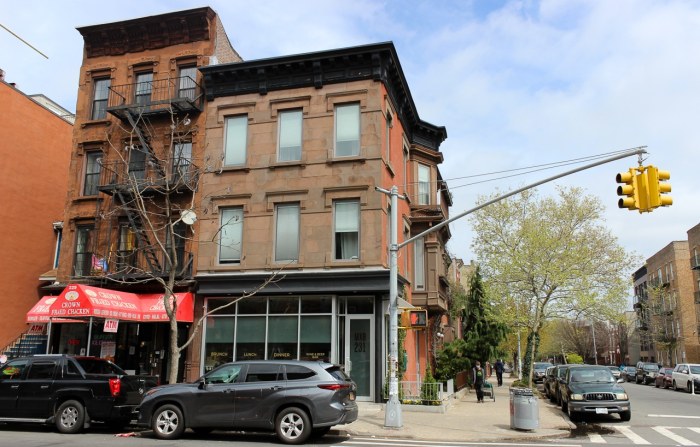The U.S. attorney in Manhattan will use posters in gay neighborhoods featuring the pictures and names of convicted crystal dealers, their prison sentences, and text asking “Was it worth it?” in an effort to dissuade gay men from selling the drug.
The posters are meant to “stem the growth of crystal meth distribution in New York City, by increasing the awareness among users and distributors of the criminal penalties associated with dealing the drug,” according to an October 28 press statement from David N. Kelley, U.S. attorney for the Southern District of New York.
The statement named five dealers who will be used in the campaign. They are Ronald “Sammy” Watkins and Herminio “Jo Jo” Madlangbayan, Jr., both serving seven-year sentences, Michael D. Gordon and Albrecht Pansing, both serving six-year sentences, and William M. Cullum, who received a sentence of just over seven years on October 28.
The posters will be displayed “in areas where the individuals did their drug dealing, including the Chelsea neighborhood where many of the drug deals took place,” according to the statement.
Defense attorneys who represented some of these men are objecting to the posters.
“I think it’s a really misguided idea,” said Steven Statsinger, an attorney with the Federal Defender Division of the Legal Aid Society. “All of these posters, including my client’s, compromise these people’s privacy in a way that is not useful. If the government is really serious about doing something about the crystal problem, it should be offering treatment instead of wasting money on posters and meaningless gestures.”
The statement announcing the poster campaign included news of Cullum’s sentence. Statsinger said the sentence was not a victory for the government.
“With respect to Mr. Cullum’s case, I think the press release is really misleading,” he said. “In a humiliating rebuke to the government, the judge sentenced him to below what the guidelines required, which was 135 months.”
Under federal law, a meth dealer can face a mandatory prison sentence of a minimum of five years to a maximum of 40 years or a minimum of ten years to a maximum of life in prison depending on the amount sold. Cullum was facing a 135-month minimum sentence, or just over 11 years, but his time was reduced because he satisfied other sentencing requirements including the fact that his crime was not violent and a gun was not involved.
Isabelle A. Kirshner, a criminal defense attorney at the law firm Claman and Rosenberg, also objected to the posters.
“These people have accepted responsibility for their crimes, they have pleaded guilty, they have been sentenced,” she said. “The need to continue to humiliate them seems to be counterproductive in terms of eventually having them reabsorbed into society.”
Kirshner has represented several gay men who were charged with meth dealing. Pansing is one of her clients. Kirshner said he is serving a five-year sentence.
The U.S. attorney’s office has used similar posters to fight gun crimes or drug dealing in other neighborhoods.
“If they have done it before, then let us see how effective it was,” Kirshner said. “I can’t imagine that if this was a straight kid they would be doing this.”
The Crystal Meth Working Group (CMWG), which received city funds earlier this year to produce an anti-meth campaign, condemned the federal ads in a November 1 press statement.
“Gay men telling other gay men that crystal is dangerous is one thing,” said Peter Staley, a CMWG member, in the statement. “We’ve been doing a lot of that lately, and it’s had a huge effect in our community’s attitudes about meth. It is quite another thing for government, especially law enforcement agencies, to threaten gay men with what look like wanted posters. It won’t work, and will likely undermine the efforts of community activists that are trying to fight this problem.”
The Gay Men’s Health Crisis (GMHC) and the Lesbian, Gay, Bisexual and Transgender Community Center also received city funds for anti-crystal ads.
Dr. Barbara E. Warren, director of organizational development, planning and research at the Center, said there was no evidence that such a campaign will be effective, but she praised the federal prosecutor for the campaign.
“Good for them that they are investing some of their dollars in prevention as opposed to just interdiction,” she said.
Ultimately, an effective response to meth may require many different campaigns and treatment programs, according to Warren.
“You can’t just put up a print media campaign and say that will do it,” she said. “You have to do a multi-pronged approach and it has to be ongoing… Everybody is looking for the one thing that will work and there isn’t one thing.”
Noel Alicea, a GMHC spokesperson, said the posters would not prove useful to their clients.
“Our primary concern is with the folks who are using and at highest risk for using,” he said. “We are making sure that there are treatment options for people who are addicted and making sure there is real information for people who are contemplating use… For folks who are using we’re not sure how effective these would be.”
We also publish:



































